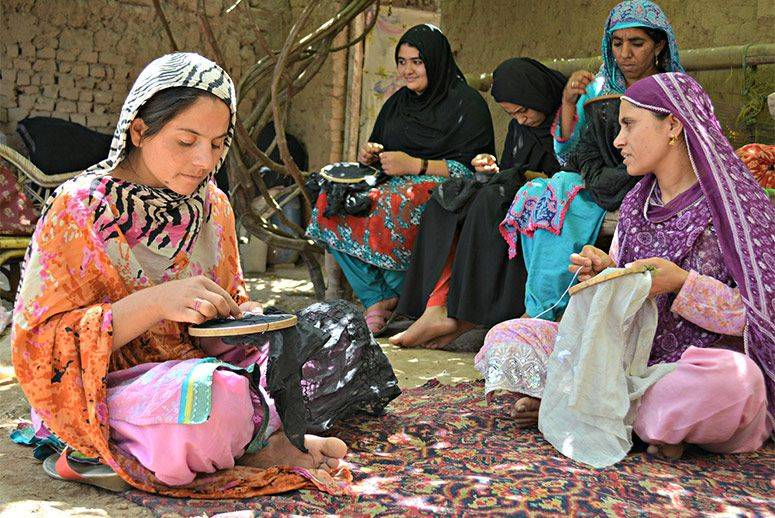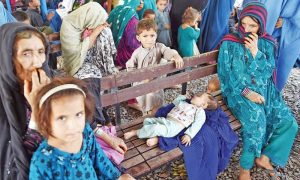
ISLAMABAD: As war-torn Afghanistan continues to experience of violence with the prospects of the Taliban’s return are increasing amid the peace talks with the US, Al Jazeera in an exclusive report says the female refugees in Pakistan are reluctant to return to Afghanistan because they fear violence and the forced recruitment of their children as child soldiers.
They also cited the lack of access to education and poor healthcare facilities as further reasons why they do not want to go back, as the UN refugee agency’s voluntary repatriation programme targets some of 1.4 million registered Afghan refugees in Pakistan.
"My husband died in a blast in Kabul in 2015 which terrified me and made me to think about the security of my children. After my husband's death, [we] migrated to Pakistan for survival," Khor Bibi, a 50-year-old widow from Kabul, said, as she expressed her worries about the safety of her family.
She added that her husband was the family's breadwinner and his death had "perished my life completely".
"I don't have the courage to lose my children in the never-ending conflict," said Bibi. "Although living here in a refugee camp is cumbersome, at least we are living with satisfaction that our lives are safe here. We feel secure here and do not want to go back."
In 2017, according to Human Rights Watch, at least 2,000 civilians were killed in attacks across Afghanistan. In 2018, according to UN figures, there were 3,804 deaths - a record - and 7,189 injuries.
Over the past 10 years, more than 32,000 civilians have been killed and 60,000 have been wounded.
In the first quarter of 2019, UNAMA has documented 581 civilian deaths, including 150 children killed.
Asghari, a refugee from the eastern Afghan province Laghman, said: "We don't want to go back to war-stricken Afghanistan because of the fear of recruitment of children as child soldiers by armed groups."
She claimed that fighters and security forces pressure families to recruit their children for military operations.
If they deny, she said the Taliban fighters have reportedly threatened to either kill male members of the family or destroy the family home.
"Children are also being kidnapped by anti-state elements to become suicide bombers, plant improvised explosive devices (IEDs) or carry out other terrorist activities.
"I don't want my children to be recruited as child soldiers, that's why I don't want to return.
"We also do not have a house or property in Afghanistan, so why should we go?"
A UN report from May last year verified 84 cases of the recruitment and use of boys in Afghan conflicts in 2017. They were used as suicide bombers, for combat, as bodyguards at checkpoints, to assist in intelligence gathering and plant IEDs.
The UNHCR's Voluntary Repatriation Programme for registered Afghan refugees began on March 1; so far 1,200 refugees have been returned.
When they do reach home, the agency gives them each $200.
A total of 4.4 million refugees have been repatriated since 2002.
Gul Dana, a refugee from Kunduz, said a 13-year-old boy in her extended family was killed in a blast near a school several years ago.
"I want to educate my children," she said, "and get rid of the vicious cycle of poverty - but it's not possible in Afghanistan."
Schools regularly come under attack in Afghanistan.
"Because of the ongoing conflict and damaged infrastructure of schools in Afghanistan, most children are out of school and poverty pushes them into child labour," said Dana.
A UNICEF report published in June 2018 reveals nearly half of the children aged between seven and 17 years old - 3.7 million in Afghanistan - are being deprived of school. And 60 per cent of them are girls.
Besides education, Dana fears having little or no access to healthcare. The World Health Organization in 2017 said 24 health facilities were attacked and damaged, while 164 were forced to close temporarily because of insecurity and conflict.

Many of the women also worried about the Taliban's record on denying women rights, as peace talks include negotiations with the armed group.
Dana said that if a woman goes to the market without a male guardian in Afghanistan and is caught by the Taliban, she faces lashes.
There have been recent reports of the Taliban flogging women in Afghanistan, which have added to concerns.
Ijaz Khan, a professor of international relations department at the University of Peshawar, said in Taliban-controlled areas, women's rights continue to be violated.
He explained that compared with men, women do not have the same access to education and cannot leave the house without a male relative. He fears that if the Taliban shares power under a peace deal, it would reverse whatever progress that has been made.
They also cited the lack of access to education and poor healthcare facilities as further reasons why they do not want to go back, as the UN refugee agency’s voluntary repatriation programme targets some of 1.4 million registered Afghan refugees in Pakistan.
"My husband died in a blast in Kabul in 2015 which terrified me and made me to think about the security of my children. After my husband's death, [we] migrated to Pakistan for survival," Khor Bibi, a 50-year-old widow from Kabul, said, as she expressed her worries about the safety of her family.
She added that her husband was the family's breadwinner and his death had "perished my life completely".
"I don't have the courage to lose my children in the never-ending conflict," said Bibi. "Although living here in a refugee camp is cumbersome, at least we are living with satisfaction that our lives are safe here. We feel secure here and do not want to go back."
In 2017, according to Human Rights Watch, at least 2,000 civilians were killed in attacks across Afghanistan. In 2018, according to UN figures, there were 3,804 deaths - a record - and 7,189 injuries.
Over the past 10 years, more than 32,000 civilians have been killed and 60,000 have been wounded.
In the first quarter of 2019, UNAMA has documented 581 civilian deaths, including 150 children killed.
Asghari, a refugee from the eastern Afghan province Laghman, said: "We don't want to go back to war-stricken Afghanistan because of the fear of recruitment of children as child soldiers by armed groups."
She claimed that fighters and security forces pressure families to recruit their children for military operations.
If they deny, she said the Taliban fighters have reportedly threatened to either kill male members of the family or destroy the family home.
"Children are also being kidnapped by anti-state elements to become suicide bombers, plant improvised explosive devices (IEDs) or carry out other terrorist activities.
"I don't want my children to be recruited as child soldiers, that's why I don't want to return.
"We also do not have a house or property in Afghanistan, so why should we go?"
A UN report from May last year verified 84 cases of the recruitment and use of boys in Afghan conflicts in 2017. They were used as suicide bombers, for combat, as bodyguards at checkpoints, to assist in intelligence gathering and plant IEDs.
The UNHCR's Voluntary Repatriation Programme for registered Afghan refugees began on March 1; so far 1,200 refugees have been returned.
When they do reach home, the agency gives them each $200.
A total of 4.4 million refugees have been repatriated since 2002.
Gul Dana, a refugee from Kunduz, said a 13-year-old boy in her extended family was killed in a blast near a school several years ago.
"I want to educate my children," she said, "and get rid of the vicious cycle of poverty - but it's not possible in Afghanistan."
Schools regularly come under attack in Afghanistan.
"Because of the ongoing conflict and damaged infrastructure of schools in Afghanistan, most children are out of school and poverty pushes them into child labour," said Dana.
A UNICEF report published in June 2018 reveals nearly half of the children aged between seven and 17 years old - 3.7 million in Afghanistan - are being deprived of school. And 60 per cent of them are girls.
Besides education, Dana fears having little or no access to healthcare. The World Health Organization in 2017 said 24 health facilities were attacked and damaged, while 164 were forced to close temporarily because of insecurity and conflict.

Many of the women also worried about the Taliban's record on denying women rights, as peace talks include negotiations with the armed group.
Dana said that if a woman goes to the market without a male guardian in Afghanistan and is caught by the Taliban, she faces lashes.
There have been recent reports of the Taliban flogging women in Afghanistan, which have added to concerns.
Ijaz Khan, a professor of international relations department at the University of Peshawar, said in Taliban-controlled areas, women's rights continue to be violated.
He explained that compared with men, women do not have the same access to education and cannot leave the house without a male relative. He fears that if the Taliban shares power under a peace deal, it would reverse whatever progress that has been made.
